 15 citations,
May 2020 in “BMC complementary medicine and therapies”
15 citations,
May 2020 in “BMC complementary medicine and therapies” Polygonum multiflorum extract helps hair grow longer and fights the effects of hormones that cause hair loss.
 1 citations,
May 2021 in “Journal of Cosmetic Dermatology”
1 citations,
May 2021 in “Journal of Cosmetic Dermatology” Cosmetic foam product reduces hair loss and increases hair density in men.
 January 2017 in “Springer eBooks”
January 2017 in “Springer eBooks” Eating a balanced diet with specific nutrients can help manage menopause symptoms and prevent related health issues.
 5 citations,
September 2016 in “Journal of Cosmetic Dermatology”
5 citations,
September 2016 in “Journal of Cosmetic Dermatology” Nourkrin® with Marilex® may increase hair count by 35.7% in postpartum hair loss.
 36 citations,
February 2017 in “BMC Complementary and Alternative Medicine”
36 citations,
February 2017 in “BMC Complementary and Alternative Medicine” Geranium sibiricum extract helps hair grow and is more effective than minoxidil but can be toxic in high concentrations.
 1 citations,
October 2021 in “Gene, cell and tissue”
1 citations,
October 2021 in “Gene, cell and tissue” Grape sap may help reduce hair loss and promote hair growth in rats.
 30 citations,
October 2015 in “Journal of Ethnopharmacology”
30 citations,
October 2015 in “Journal of Ethnopharmacology” Herbal compounds like ricinoleic acid, quercetin-3-O-rutinoside, and hinokiflavone may be safe and effective for treating hair loss.
 45 citations,
August 2018 in “Stem Cells International”
45 citations,
August 2018 in “Stem Cells International” Stem cells, especially from fat tissue and Wharton's jelly, can potentially regenerate hair follicles and treat hair loss, but more research is needed to perfect the treatment.

The conclusion is that closing scalp wounds is possible, but restoring hair without donor material is still a major challenge.
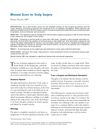 10 citations,
January 2007 in “Dermatologic Surgery”
10 citations,
January 2007 in “Dermatologic Surgery” New scalp surgery technique results in thinner, less visible scars.
 May 2024 in “Journal of cosmetic dermatology”
May 2024 in “Journal of cosmetic dermatology” Heat-treated Limosilactobacillus fermentum with menthol, salicylic acid, and panthenol promotes hair growth and balances scalp microbiome in people with androgenetic alopecia.
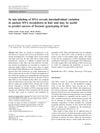 27 citations,
April 2011 in “International journal of legal medicine”
27 citations,
April 2011 in “International journal of legal medicine” In situ DNA labeling in hair can help predict forensic DNA analysis success.
 76 citations,
August 2018 in “International Journal of Cosmetic Science”
76 citations,
August 2018 in “International Journal of Cosmetic Science” Dermal Papilla cells are a promising tool for evaluating hair growth treatments.
42 citations,
June 2019 in “Aging” 3,4,5-tri-O-caffeoylquinic acid promotes hair growth by activating the β-catenin pathway.
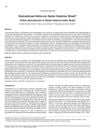 1 citations,
January 2020 in “Revista Brasileira de Ciência Veterinária”
1 citations,
January 2020 in “Revista Brasileira de Ciência Veterinária” A cat in Brazil had severe skin issues worsened by improper treatment.
 24 citations,
January 2014 in “The American Journal of Chinese Medicine”
24 citations,
January 2014 in “The American Journal of Chinese Medicine” The leaves of Platycladus orientalis have potential health benefits but require more research for safety and understanding how they work.
 7 citations,
February 2013 in “Tropical Journal of Pharmaceutical Research”
7 citations,
February 2013 in “Tropical Journal of Pharmaceutical Research” Licorice root extract may promote hair growth in female rats.
 19 citations,
January 2010 in “International Journal of Ayurveda Research”
19 citations,
January 2010 in “International Journal of Ayurveda Research” Tectona grandis Linn. seeds extract improved hair growth in mice better than minoxidil.
 67 citations,
May 2007 in “Journal of Cosmetic Dermatology”
67 citations,
May 2007 in “Journal of Cosmetic Dermatology” The herbal formulation promoted hair growth faster and more effectively than minoxidil in rats.
 November 2023 in “Food science of animal resources”
November 2023 in “Food science of animal resources” Lactilactobacillus curvatus LB-P9 taken orally helps hair regrow faster and thicker in mice.
 15 citations,
August 2006 in “Journal of Cutaneous Pathology”
15 citations,
August 2006 in “Journal of Cutaneous Pathology” HIV-1 may cause increased stem cell death in hair follicles, leading to hair loss.
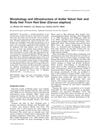 18 citations,
November 2010 in “Journal of morphology”
18 citations,
November 2010 in “Journal of morphology” Antler velvet hair and body hair of red deer have different structures that help with protection and insulation.
 7 citations,
August 2022 in “Nature communications”
7 citations,
August 2022 in “Nature communications” A specific group of slow-growing stem cells marked by Thy1 is crucial for skin maintenance and healing in mice.
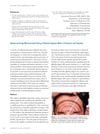 1 citations,
May 2016 in “Dermatologic Surgery”
1 citations,
May 2016 in “Dermatologic Surgery” The document concludes that using a phototrichogram with a protractor and tapeline is a reliable and noninvasive way to measure hair loss.
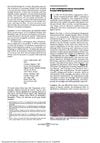 6 citations,
November 1996 in “Archives of Dermatology”
6 citations,
November 1996 in “Archives of Dermatology” A man's relapsed leprosy was successfully treated with the antibiotic sparfloxacin.
 28 citations,
May 2017 in “Molecular ecology”
28 citations,
May 2017 in “Molecular ecology” Researchers found genes that control hair color and growth change before the visible coat color changes in snowshoe hares.
 107 citations,
September 2002 in “Journal of Investigative Dermatology”
107 citations,
September 2002 in “Journal of Investigative Dermatology” Researchers found that hair shedding happens mostly when new hair is growing and involves a unique process.
 30 citations,
November 1996 in “Archives of Dermatology”
30 citations,
November 1996 in “Archives of Dermatology” UV rays can cause a type of hair loss known as telogen alopecia.
October 2022 in “International Journal of Molecular Sciences” Fish collagen peptides can significantly promote hair growth.
 June 2024 in “Frontiers in pharmacology”
June 2024 in “Frontiers in pharmacology” 2-deoxy-D-ribose gel may help regrow hair in cases of hair loss.



























